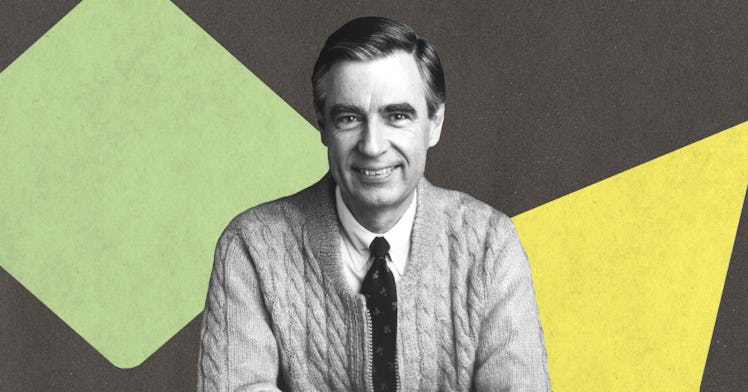Was Mr. Rogers Bisexual? It’s Complicated.
"I have found women attractive, and I have found men attractive."

Fred Rogers was a lot of things. Most famously the host of and creative force behind Mister Rogers’ Neighborhood, the Pittsburgh icon was also a vegetarian, lifelong Republican, and Presbyterian minister. He also might have been, according to a recent biography, a bisexual man.
The biography is titled The Good Neighbor: The Life and Work of Fred Rogers. It was written by Maxwell King, the president and CEO of the Pittsburgh Foundation. It was published last September, but the conversation about Rogers’ sexuality is happening now thanks to a Twitter exchange that’s gotten a lot of attention.
On March 3, queer editor and YouTuber Cece Ewing tweeted that, her grandmother, after watching Won’t You Be My Neighbor and reading King’s book, informed her that Mr. Rogers was bisexual. In response, photographer Gabriel Lunesce posted the relevant passage in the form of a screenshot taken from Google Books.
In the excerpt, longtime Rogers associate Eliot Daley, who produced and wrote scripts for Mister Rogers’ Neighborhood, says that his collaborator “wasn’t a very masculine person, he wasn’t a very feminine person; he was androgynous.” Anyone who’s watched Rogers on television would have to agree.
King also quotes a New York Times story from 1975, in which he says “I’m not John Wayne, so consequently, for some people, I’m not the model for the man in the house.” His androgyny and lack of machismo meant that those who knew him were often asked if Rogers was gay.
The actual evidence for Rogers’ bisexuality, however, comes from a reference King makes to a conversation Rogers had with his friend William Hirsch, an openly gay psychologist. If sexuality were a scale, Rogers reportedly told Hirsch, “Well, you know, I must be right smack in the middle. Because I have found women attractive, and I have found men attractive.”
Lunesce’s tweet was greeted with glee from Twitter, where many were quick to claim Rogers as the newest hero of the bisexual community.
Adopting Rogers as a member of the LGBTQ community is tricky, however, given that there isn’t much evidence he was ever an advocate for that community. Personally, he wasn’t homophobic, but Rogers tended to err on the side of acquiescence over activism when it came to gay rights. King describes how Rogers encouraged François Clemmons, a close friend and actor on the show, to hide his sexuality to help his career. Rogers only changed his advice after homosexuality became more visible after the Stonewall riots.
Then there’s the question of his own actions. King writes that “without exception, close associates concluded that Fred Rogers was absolutely faithful to his marriage vows.” That means that Rogers, who met his wife in his early twenties, likely never had a romantic encounter with a man or, if he did, that he didn’t for the last fifty plus years of his life. At most, he was a non-practicing bisexual that never described himself as such using that term in public.
Of course, there are many other reasons to hold Fred Rogers up as a hero. By nearly all accounts, he was an exceptionally decent person who accomplished his goal of making a crass medium humane, one that could do more good than harm to kids. King’s book shows that he also was a thoughtful man who embraced the gay people in his life. That being said, with what we know now, it’s inconclusive as to whether Rogers would have self-identified as a bisexual man.